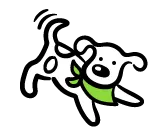
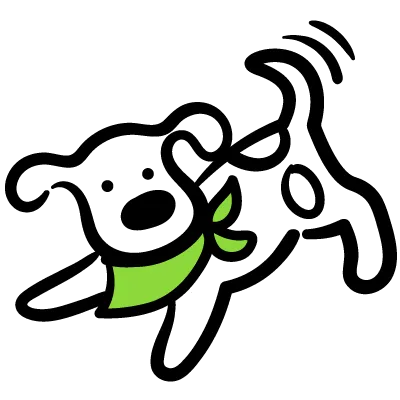
About Us
Since 2011, we’ve combined formal education in psychology, veterinary care, and canine cognition to provide exceptional training.
As an SPCA Accredited AnimalKind organization, we rely on the latest research, while ensuring that our work is rooted in 15,000 years of human-dog connection.
Dogs and humans have evolved together for 20,000 years. They have found food for us, and protected our families and livestock. They have gone to war with us and acted as gentle playmates for our children. They have laid down their lives to save us.
Our lifestyles have changed a lot in the last century, but our need for dogs hasn't. A dog and their owner, when reunited, sync their heart rates within minutes. Just owning a dog decreases heart attack mortality by 30%.
We are designed to live with dogs, but we need to learn how to incorporate them into our chaotic modern lives.
We're here to help your dog become a helpful and contributing member of your modern family.
Forget sit and stay!
At Wag The Dog we can teach dogs to:
Find our phones and keys when we lose them.
Find our children when we lose them!
Put recycling in the blue bin.
Fetch their own leash for walks.
Comfort us when we are sad or stressed.
Close doors and cupboards.
Imitate our actions.
Communicate their needs and thoughts clearly.
Recognize fragile people like children and the elderly and be cautious around them.
Assist us with our disabilities
Accompany us on outings to stores and markets.
Trust us to return home to them when we go out.
Understand simple phrases and two step instructions.
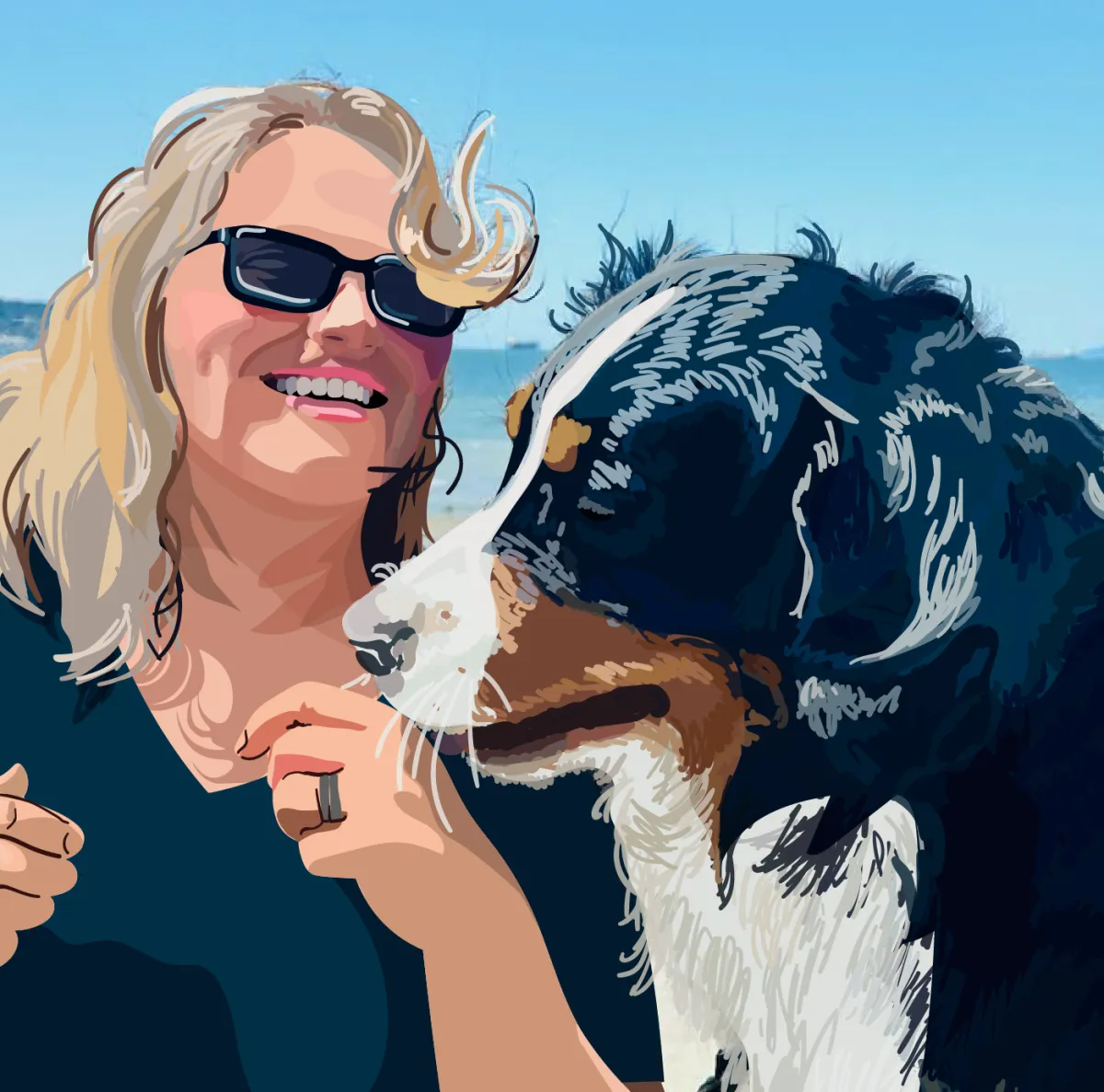
Carol Millman (she/her)
- Lower Mainland
B.Sc, Psychology, Veterinary Technologist, Certified Pet Dog Trainer - Knowledge Assessed (2022), Certified Trick Dog Instructor
Carol lives in Port Coquitlam and works in the Lower Mainland. Her autism gives her a unique perspective which she brings to her work with both dogs and people. Her time working as a veterinary nurse culminated in becoming the Director of Medical Services at a holistic veterinary clinic.
In 2008, Carol was hired as an apprentice Advanced Instructor at Pacific Assistance Dogs Society (PADS). She trained and placed wheelchair assistance dogs, hearing dogs for the Deaf, and facility therapy dogs. She also ran puppy classes and assisted in the daily care of the dogs in training.
PADS still sends people Carol's way when they are looking for private service dog training.
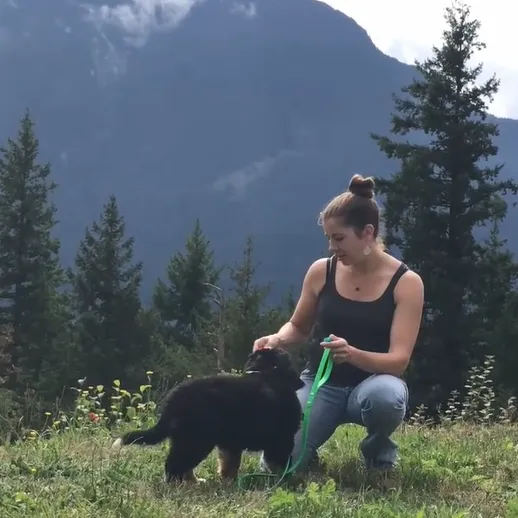
- Currently On Leave -
Amelia Kellum (she/her) - Fraser Valley
B.Sc Canine Studies, Certified Professional Dog Trainer Knowledge/Skills Assessed (2022), Certified Trick Dog Instructor.
Amelia is a certified professional dog trainer with nearly two decades of experience training dogs - including hunting, acting, and assistance dogs such as hearing, therapy, guide, and mobility dogs.
Amelia has learned directly from Bonnie Bergin, pioneer of the disability assistance dog, and is also a graduate of the Ben Kersen and the Wonderdogs professional trainer's program.
She apprenticed at PADS as an instructor and has been training independently since 2010. She now lives in Hope with her family.
What can you achieve
with our help?
Come check out our blog!
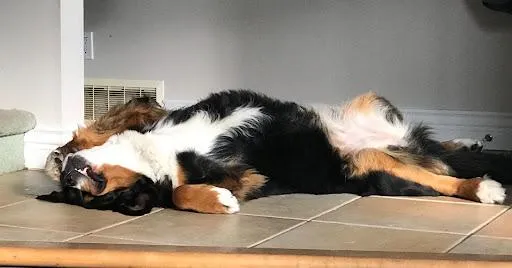
Bang! Why Your Dog Should Play Dead At The Vet
Bang! Why Your Dog Should Play Dead At The Vet
Amelia Kellum B.Sc, CPDT-KSA, CTDI
November 12, 2021
Play dead is the oldest trick in the book, and while it may be an oldie, it is most definitely a goodie. It is adorable, easy to teach, and furthermore, it is incredibly useful.
If you have ever struggled to clip your dog's nails, treat a wounded foot, or check a hot spot on your dog's inner thigh, then you know that getting your dog to lay still on their side is an indispensable skill.
My husband's dog came to us with a fear of veterinarians, and developed a mysterious open wound on his paw that needed attention. The vet bit her lip, and wondered aloud how on earth we should go about examining this 110 pound Presa Canario's sore foot. Of course, we want to make sure not to upset him by just grabbing his foot.
"Perhaps we should get a muzzle?" she wondered. It was at that moment that I drew my gun, and fired.
Bang!
Roscoe flopped on his side, and very happily showed off his feet to the vet, who delighted in seeing this frightened beast of a dog turned soft. She rubbed his belly, and he loved the vet.
The vet's job was made easier, and most importantly, Roscoe's life was made better the day he learned to play dead.
He limped around for nearly a year before his foot healed, but he never quit happily showing off his 'bang!' trick. Dressing changes weren't stressful for him, he knew this was all part of his trick, and he loved to do it.
Play dead allows dogs to relax, and even learn to enjoy grooming and medical treatments. You can have better control over your dog while simultaneously giving them control of their own body. Your dog will prefer being asked to play dead over being grabbed, forcibly rolled-over, and held down.
The day your dog is injured, and already in a stressful situation like being at the vet, this cue will build trust, and ease your dog's suffering. Who knew that pretending you're dead is the best thing you can do at the vet?
How To Teach "Bang"
Practice using a treat to get your dog to look over their shoulder while they lie down. If your dog is not already lying down, lure them to the ground with a treat instead of using your 'down' cue, which your dog will confuse with the new behaviour.
Doing this on carpet, a soft mat, or a gently inclined grassy knoll can be helpful. Start at the dog's nose and move your lure slowly toward their shoulder.
If your dog is lying down with legs outstretched to their right, then you'll lure from their right cheek to their right shoulder, using your left hand.
Say "Yes!" and reward the moment they flop over.
You can pet their belly and keep feeding them with their head on the floor for an extra moment before you release them.
I like to use 'reanimate!' as the release cue for this one!
Dog not dead yet?
Some dogs seem to get stuck and don't flop the whole way over. Look for any movement in the right direction, say "yes!" and reward.
Make sure your hand isn't going over their head and covering their eyes, which they won't like. Twist you wrist around, moving toward the back of the neck, not over the top of the head, and let them eat as they go.
Do a few reps and try again tomorrow, your dog will be ready to give you a bit more trust and roll over farther if they have a bit of success, and then a rest.
Once your dog is flopping over easily, you can add the cue 'Bang!' Hold out your 'gun' while you say 'Bang!" and then lure them over with your treat 2 seconds later.
Always begin by holding out your gun and waiting a couple of seconds, they need time to think about it, to realize that flopping to their side always seems to follow this gun shaped hand you keep showing them.
Eventually, they will begin to anticipate your lure, and your cue "bang!" will cause them to flop to their sides… adorably.
Kids love this trick, but not all parents are fond of using 'hand' guns, so if you'd like to teach your child this trick without also teaching them to make a gun shaped hand signal, simply name the cue something else like 'belly rubs?' or 'show me your belly' or 'roll.'
You can use any hand signal you like, but don't skip this trick, your dog will thank you for all the extra belly rubs!
Reanimate!
Don't forget to release!
The release cue is the key to having your dog hold this position, remaining motionless, dead, for as long as you'd like. If they get up before you release them, help them back down with body language and/or your lure, release them without rewarding, and try again.
You can make it easy for them to hold the position at first by letting them eat a few treats while they're dead, and rubbing their belly doesn't hurt either.
Your average dog will learn this new trick by the end of the week. So that means that by this time next week, your dog won't ever need to be grabbed, rolled, or held down ever again.
Have fun and enjoy a better relationship with your dog!

We work on land which was taken from the nations who had lived here for thousands of years. They are still here and they are still waiting patiently for us to stop being jerks about it.
© 2024 Copyright Wag The Dog Training
All Rights Reserved


